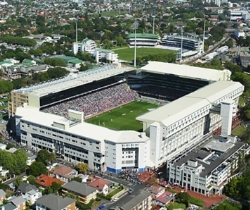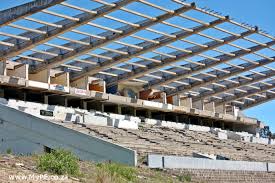
dhl Newlands, Cape Town
A Special General Meeting of the Western Province Rugby Football Union (WPRFU) was held at DHL Newlands on Wednesday 17 December 2014 to give feedback and to discuss the investigation of the feasibility and desirability to relocate to the Cape Town Stadium.
The WPRFU are the owners of the DHL Newlands Rugby Stadium – in turn, the clubs are the stakeholders and owners of the Union – and a decision to remain at DHL Newlands was carried by the clubs on Wednesday 17 December 2014, unanimously and without abstention.
The decision to NOT further consider relocating to the Cape Town Stadium was based on a number of factors, the main considerations being the following:
- The WPRFU owns Newlands Rugby Stadium – including the ground it is built on – outright and is thereby in complete control of its own destiny. Any position for the WPRFU at the Cape Town Stadium will be as a tenant or a minority shareholder in an operating entity as the city has made it very clear the ownership will always remain that of the city.
- Whilst selling Newlands Rugby Stadium and moving to the Cape Town Stadium would result in a significant one-off cash injection for the WPRFU, it would be financially very difficult to ever own, purchase or build another stadium in the future, in all likelihood relegating Western Province to a tenant in perpetuity.
- There is a model whereby the existing Newlands Rugby Stadium and surrounding properties owned by the WPRFU can be redeveloped to create an additional income stream for the Union and to enhance the area and nearby sporting stadia / facilities.
- Spectator numbers at sporting events globally are under threat on an annual basis and we are concerned about the effect on the atmosphere in catering to smaller crowds in a 55,000-seater stadium.
- Various other operational and commercial issues were also considered, including:
5.1 – The operating costs pertaining to events at Newlands Rugby Stadium are significantly lower than those at the Cape Town Stadium.
5.2 – The capital replacement costs at Newlands Rugby Stadium are significantly lower than those at the Cape Town Stadium.
5.3 – Coordination of events at the Cape Town Stadium will be more difficult – especially in light that certain major entertainment events (such as concerts) are scheduled 12 to 18 months in advance, whereas the WPRFU would finalise its Super Rugby / Currie Cup schedules only by October of the previous year.
Well done Province!
But that stadium does need a serious overhaul. I suppose they are in a similar position to the Lions, who have the option of moving to FNB Stadium, but having chosen not to, much for the same reasons as WP. So I do sympathise with them.
@ Lion4ever:
Absolutely, and I guess it’s mainly the Old School in me that says that WP Rugby must stay where it is and not move to “that” side of the Mountain!
Having said that, they really are in the pound seats with regards to stadium & land ownership etc & can surely afford to upgrade where necessary.
The same can be said for Ellis Park, the only problem being it’s such a pity the surrounding areas are in the sad state that they are.

@ BrumbiesBoy:
Which got me thinking, what exists now where the Boet Erasmus stadium (the only Test venue that I never went to) once stood?
I presume the new, improved stadium belongs to the EPRFU or am I sadly mistaken?
If so, #whathappenedtothemoney?

http://rugby.maroelamedia.co.za/2014/12/18/wp-bly-op-onveilige-nuweland/
@ superBul:
Veiligheidsmaatreëls
Die Cape Times het egter in Augustus vanjaar berig dat die stadion aan nuwe veiligheidsmaatreëls sal moet voldoen soos uiteengesit in die wet op veilige sport en ontspanning. Stadions word twee jaar gegun, wat beteken Nuweland moet aanstaande jaar daaraan voldoen.
Onder die belangrikste vereistes waaraan Nuweland tekortskiet is:
♦ Die stadion moet in ‘n noodgeval binne tien minute ontruim kan word.
♦ Daar moet opvoubare heinings wees wat die veld en die paviljoene in ‘n noodgeval van mekaar kan skei.
♦ Daar moet ‘n tydelike of permanente heliport wees.
♦ Daar moet draaihekke vir elke duisend toeskouers wees.
I was reliably told in 2009 that both the Sharks and WPRU would basically be forced to either move or rebuild their stadia within 7 years.
The reasons were essentially that neither Newlands or Kings Park can be further upgraded to meet the stringent International safety requirements for venues such as these.
The only reason why Loftus and Ellis Park are not in the same situation, is because they both underwent major renovations for FIFA WC 2010, which has effectively given them both a 15-20 year extension, after which both the Bulls and the Lions will be in the same boat as their coastal cousins.
Of course the problems become compounded when ownership of stadia impacts on event hosting costs.
For example, with the Lions owning Ellis Park outright, (though not the land, that is leased from JHB for R100/year on a 99 year lease) in 2010 the break even point for spectators v cost was less than SEVEN THOUSAND ticket paying spectators on the day!
Now let’s assume that the Lions moved to FNB, what would the costs of renting the stadium for a match be?
On top of the normal venue rental there is then the stadium security, lighting, metro police costs, cleaning etc etc etc, and suddenly you now have a break even figure 3 x higher than when you owned the ground!
It just doesn’t make economical sense in these times of dwindling crowds and our national economy which is just above junk status.
Add to that the fact that (in the Lions case) your biggest income driver, your suite owners will suddenly have to fork out nearly double for the yearly suite rental, and their catering and alcohol costs shoot up by ±60%, so half of them opt not to take up a suite option at the new ground and whether the Union and stadium owners have an agreement or not on who get’s that income, suddenly the GLRU’s revenue stream is now like a dried up river bed.
Furthermore, in the case of both Moses Mabida and Green Point, the stadia were not built with the intention of hosting top flight Rugby Football, hence the length of the grassed area is less than ideal, and would result in an “in goal” area that is just within the minimum allowed.
Whatever happens with both WP and the Sharks, there is going to be a mid term finance implication.
I just hope that the Lions don’t wait until the last minute before they address the same issue.
4 @ BrumbiesBoy:
Unfortunately you are indeed sadly mistaken.
The whole ownership and management question surrounding NMBS is a sordid tale of probable corruption and underhanded deals which involves people making relatively small cash injections into certain Eastern Cape Rugby Unions in return for long term management contracts.
TonyM who blogs here from time to time should be able to give us a lot more detailed insight into the affair.
BrumbiesBoy wrote:
**
http://en.wikipedia.org/wiki/EPRU_Stadium
http://whatishappeninginsouthafrica.blogspot.com/2011/05/pe-rugby-stadium-stripped.html
http://mype.co.za/new/boet-erasmus-white-elephant/15250/2012/07
http://www.sport24.co.za/Rugby/So-sad-Boet-Erasmus-in-ruin-20131106
**
EPRU was a tenant at Boet Erasmus.
PE Municipality owns the stadium & land.
There are bylaws that prohibit a building’s owner neglecting its property to such an extent that it becomes a derelict refuge for vagrants, an eyesore reducing the value of nearby 3rd party properties, & causes a health risk.
Ironically, the Municipality, the owner of this property, is also the entity entrusted with enforcing these bylaws.
This degradation might be a countrywide phenomenon (but I can’t say for sure) but (especially) since the onset of the New South Africa, I’ve noticed here in Durban several community based sports club buildings & fields leased by such clubs on land owned by the Municipality, & also some municipal parks, fall into disrepair, disuse, go to rack & ruin, & even become crime (drug peddling & abuse, prostitution, robbery & rape) hot spots.
As an example, over the past 34-35 years I’ve witnessed Durban’s (once desirable/attractive) Albert Park/Victoria Embankment precinct (an area adjacent to & looking out onto the natural & man made beauty of Durban Bay & its yacht mole) turn into a filthy, crumbling, crime ridden & dangerous area. And this is despite the presence of a SA Police Station just a few hundred metres away – yet, go there & nary a police officer you will see.
It is a shameless dereliction of fiduciary duty by the municipalities & City & SA Police.
Attachment:
The Boet, Sep 2014:
Some Boet Erasmus nostalgia:
http://archiver.rootsweb.ancestry.com/th/read/SOUTH-AFRICA-EASTERN-CAPE/2006-05/1148253546
http://www.mocfoundation.co.za/index.php/sa-rugby
@ Scrumdown:
@ Angostura:
Thanks guys, your info is appreciated.
When I posted last night I honestly thought that I’d read that residential development, shopping centres etc would at least stand there now.
The articles I’ve just read & the pictures of the sad state of affairs that I’ve just seen have nauseated & appalled me no end.
Heaven help us
Users Online
Total 26 users including 0 member, 26 guests, 0 bot online
Most users ever online were 3735, on 31 August 2022 @ 6:23 pm
No Counter as from 31 October 2009: 39,393,489 Page Impressions
_